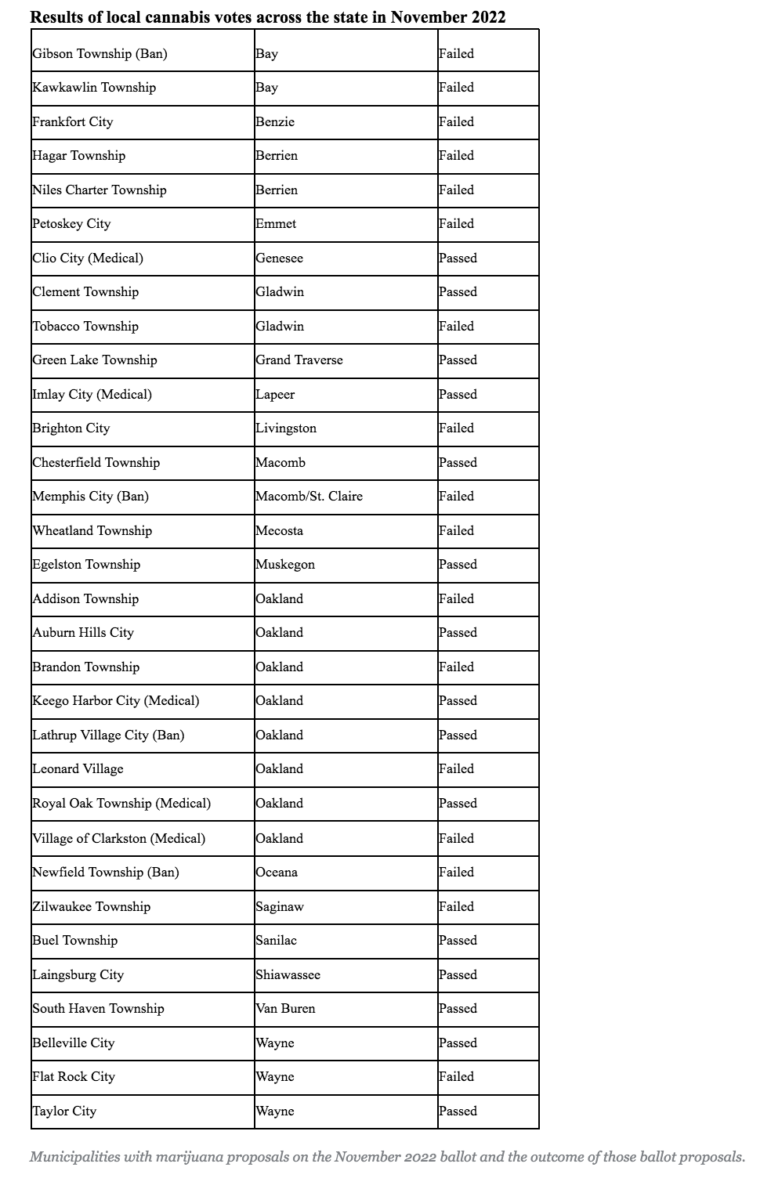By JACK TIMOTHY HARRISON
Capital News Service
LANSING – The results of Michigan’s local ballot proposals in November to legalize retail recreational marijuana were mixed, with about half passing, expanding the number of municipalities that allow cannabis businesses.
By the end of 2022, 129 municipalities chose to permit adult-use cannabis, and 1,378 communities opted out.
In 2018, voters approved a statewide ballot proposal that permits adult-use recreational cannabis but allows localities to opt out or pass their own regulatory policies. As a result, users and those in the industry have to navigate these differences.
The National Organization for the Reform of Marijuana Laws, or NORML, seeks to protect access for cannabis consumers, said Rick Thompson, the Michigan’s chapter executive director.
Following approval of the 2008 medical cannabis proposal, Thompson said public support for marijuana businesses has been uneven across Michigan.
“We do see suburban areas, for example, those areas outside of Grand Rapids and those areas outside of Detroit, that have been more eager to accept cannabis businesses than sometimes their rural counterparts,” Thompson said.
“However, it’s very surprising the number of communities in what you’d normally consider to be conservative zones, which have come on board to accept cannabis retailers, cultivation centers and other businesses,” he said.
Localities that legalize sales can impose restrictions, such as limiting the number of licenses and setting zoning requirements.
Thompson said more northern communities are allowing sales including the village of Kalkaska, Alpena and Traverse City.
“Although it’s frustrating to many cannabis consumers and corporations, I support local approval of cannabis businesses, and Michigan NORML does as well,” Thompson said. “That’s how this whole 2018 ballot proposal was sold to voters.”
New businesses must apply for licenses through the state Cannabis Regulatory Agency.
David Harns, the communications director for the agency, said licensing involves a two-step process, with applicants needing approval from a municipality and the state.
Tony Stewart said he is no longer in the industry because of licensing and his local township. When the 2008 law passed, Stewart opened a medical cannabis business in Pittsfield Township in Washtenaw County.
Stewart said the state allowed wealthy applicants from out of state to get licenses, making it harder for in-state smaller businesses and growers to stay in the game, including those selling medical pot.
He said he had been in the business “from the beginning,” and “that just didn’t settle well.”
The state did not stay consistent with its rules, often changing them, Stewart said, but municipalities also share responsibility.
“And after a time, it was like, ‘Wow, I don’t want to play that deeply in the bureaucracy of it all,’” Stewart said. “That’s what really drove me out, that finally I just didn’t want to play their game.”
Matt Baker is in the market, commercially growing cannabis in Jackson County’s Leoni Township, which he said has been fairly cannabis friendly.
According to Baker, Michigan has one of the most highly regulated cannabis markets, but it is still open enough to have significant competition for businesses.
He said the state has treated cannabis as a gaming industry, rather than as an agricultural one. By setting their own rules, municipalities weave a complicated web that is cumbersome to businesses.
In Northern Michigan, Greg Davis owns the Lake View Motel and Gift Shop in Lake City, in Missaukee County, a couple of miles from Cadillac, where there are several recreational and medical cannabis stores.
Since recreational and medical cannabis sales are not legal in Missaukee County, Davis said many users travel to Kalkaska or Cadillac to shop, and Missaukee residents are fine with that arrangement.
Davis said that Missaukee County is agrarian, so once cannabis became legal, many people started growing it themselves.
He anticipates other Northern Michigan municipalities passing recreational measures.
“As more and more people move up from the southern part of the state, we’ll keep seeing more and more push to get it opened up here,” Davis said.
Election results in northern communities were mixed.
In Green Lake Township in Grand Traverse County, a measure to allow two recreational retailers passed with 56% support. Two municipalities in Gladwin County also had ballot measures, with voters passing a proposal in Clement Township and rejecting another in Tobacco Township.
Voters in Petoskey struck down a proposal, with 45% of the vote, as did voters in Frankfort, with only 38% supporting it.
Nena Bondarenko was involved in the effort to defeat the proposal in Frankfort. After she found out the proposal had made it onto the ballot, she worked alongside other concerned community members, sending out mailers and talking with voters.
Bondarenko lives in Benzonia Township. With four dispensaries, it’s the only township in Benzie County that permits recreational use, she said. The proposal in Frankfort would have allowed a single cannabis establishment in the city.
Bondarenko said Frankfort’s small size may have made it easier to put the measure on the ballot, and she remains concerned about cannabis use.
As for the industry’s future, Thompson predicted some businesses will fail in the next two years as retail prices drop, but said he believes additional communities will gradually allow cannabis businesses.
